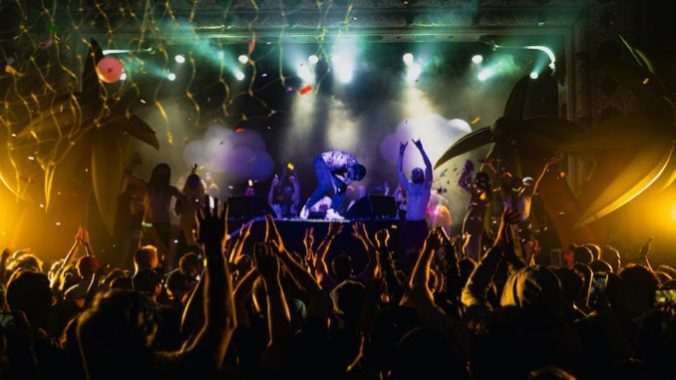The Best Concerts of the Year: Girl Talk at First Avenue
Photo by Teddy DeMask
Being trans in a public space can often feel like a shortcut to feeling out of place. Even in spaces without any outright malice, it can be mentally taxing to just exist, dwelling on what sets you apart from so many others in a crowd—a hyper-awareness of the added layers of meaning your gender expression holds. Concertgoing, sometimes, can exacerbate this. I may get even more protective of my body than usual as people press closer together, more self-conscious of the space my body takes up in a mostly cisgender crowd.
But concertgoing as a trans person can be freeing in its own right in the best circumstances. It can be a night to escape your reality, or a chance to better come to terms with your gender through music. I’ve especially tended to feel the latter going to shows from female and/or trans musicians. But in 2022, I found my most gender affirming concert in an unexpected place: a Girl Talk show.
Girl Talk, the artistic moniker of Gregg Gillis, has been one of the biggest names in mashups since his breakthrough album Night Ripper in 2006, which firmly established his anarchic approach to smashing together brief samples across decades of rap, rock and pop into euphoric record-length mixes. And though he hasn’t released a full-length in that style since 2010’s All Day—instead lending his production to the fun collab record Full Court Style with Wiz Khalifa, Big K.R.I.T, and Smoke DZA earlier this year—Gillis never goes more than a few years without bringing the same sugar-rush mashups that put him on the map to a live setting.
Despite being an avid Girl Talk listener since my early college days of (futilely) trying to imitate his style in Audacity, I had never actually seen him perform until this year. Part of that was due to Gillis mainly playing festivals in the late 2010s, and part of that came from skipping his set at 2017’s Panorama Festival to camp out all day for a spot close to Frank Ocean. (Can you blame me?) When Gillis finally did announce his first headlining tour in ages in 2020, I was elated to finally make up for lost time. Then, as you might expect, the show was delayed to 2021. Then April 2022. Then, mere days before the rescheduled date, back to May 2022 due to a positive COVID test result in the touring party.
Suffice it to say that finally getting to see Girl Talk live became far more of a journey than I had ever intended it to be—and that’s before accounting for the years I spent transitioning since getting into the man’s music. In the weeks leading up to the concert, I know I likely wouldn’t have a chance to see a show from him again for some time. So—in spite of my typical trans anxiety with concerts, or perhaps because of it—I came up with a plan to make it one worth remembering.
For the unfamiliar readers, Girl Talk’s crew has a reputation for bringing up a posse of audience members each show to dance with him onstage, all while balloons rain down and confetti cannons are fired into the crowd. I’m dead-set on being one of these dancers, and will do anything I can to make it onstage. I read up on tips on how to catch the crew’s eye from fans. I break out an especially form-fitting top and leather leggings. I even model my eyeshadow for the evening on the album art for Night Ripper, hoping it’ll make me stand out more. (Another key workaround to any nervousness I have with going to shows as a trans woman: using the night as an excuse to show off revealing femme outfits and extravagant makeup—leaning so fully into feminine gender expression that I override any fears of being a gender interloper.)
-

-

-

-

- Curated Home Page Articles By Test Admin October 21, 2025 | 3:10pm
-

- Curated Home Page Articles By Test Admin October 21, 2025 | 2:57pm
- Urls By Test Admin October 21, 2025 | 2:57pm
- Curated Home Page Articles By Test Admin October 21, 2025 | 2:55pm
-

-

-

-

-

-

-

-

-

-

-

-

-

-

-

-

-

-

-

-

-

-

-

-

-

-

-

-

-

-

-




































